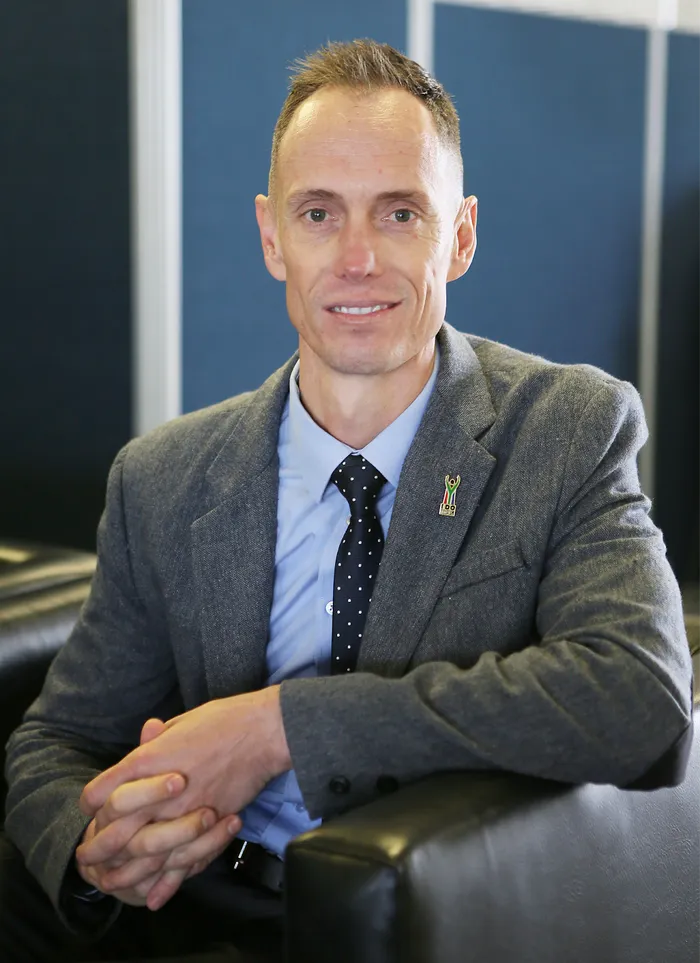Empowering community leaders in fight against TB

Renier Coetzee is an Associate Professor at the University of the Western Cape’s School of Public Health (SOPH), where his primary research focus is on antimicrobial stewardship, particularly in improving antibiotic utilisation in low- and middle-income countries.
Image: Ruvan Boshoff/ UWC
Renier Coetzee, Associate Professor at the University of the Western Cape’s School of Public Health
On Monday March 24, we celebrate World TB Day by honouring the resilience of TB-affected communities who are driving through advocacy, mentorship, and the fight against stigma to help end South Africa’s TB crisis.
I have had the privilege of working closely with communities deeply affected by tuberculosis (TB). This experience has reinforced my belief that empowering community leaders is one of the most effective ways to address the TB crisis in South Africa, particularly in areas like Elsies River and Delft.
The TB crisis in the Western Cape
The Western Cape continues to grapple with one of the highest TB burdens globally. TB is not just a health issue; it exacerbates poverty and inequality, disproportionately affecting vulnerable populations. The intersection of TB and HIV further complicates the situation, placing immense pressure on our healthcare system and communities. Despite national strategies such as the TB Recovery Plan and the National Strategic Plan for HIV, AIDS, TB, and STIs (2023–2028), gaps in service delivery remain glaringly evident.
One of the most urgent challenges is stigma. Many individuals with TB face isolation, job loss, and rejection, which delays diagnosis and treatment. Stigma fuels fear and misinformation, perpetuating the cycle of transmission. Addressing this requires a grassroots approach where community leaders are at the forefront of this fight against TB.
The role of community leaders
Community leaders are trusted voices who can bridge the gap between healthcare systems and their communities. Through various initiatives, we have seen how equipping these leaders with knowledge and advocacy skills can transform their communities. In Delft, for example, workshops have focused on educating leaders about TB transmission, prevention, treatment, and national policies. These sessions also provided practical training in advocacy and communication.
One inspiring example is Bravo Thompson, a leader who emerged from our mentorship programme. Bravo’s journey exemplifies the power of community-driven change. Initially participating in workshops to deepen his understanding of TB, Bravo quickly became a vocal advocate for his community. His dedication earned him a place on the Western Cape Civil Society TB Task Team, where he now plays a critical role in influencing provincial strategies to combat TB stigma and improve service delivery. Bravo’s story underscores how mentorship can empower individuals to become agents of change within their communities.
Challenges: Funding crises for NGOs
Progress in fighting TB is under threat due to funding challenges. The USAID and PEPFAR funding crises have placed immense strain on NGOs that are critical to these efforts. Many organisations like TB Proof, ANOVA and TB/HIV Care rely heavily on such funding to sustain their programmes. Without adequate resources, mentorship programmes, workshops, and advocacy campaigns risk being scaled back or discontinued altogether.
This funding shortfall also affects the ability to address service gaps identified by community leaders. For instance, in Elsies River and Delft, leaders have pointed out shortages in diagnostic tools and treatment facilities. While they are eager to advocate for change, limited funding hampers their ability to implement solutions effectively.
Lessons learnt
Working closely with community leaders has taught us several valuable lessons:
Be adaptable: Each community has unique challenges that require tailored approaches.
Listen carefully: Leaders often have deep insights into their communities’ needs.
Empower through mentorship: Ongoing support helps leaders build confidence and sustain their efforts.
Combat research fatigue: Communities are tired of being studied without seeing tangible outcomes.
These lessons underscore the importance of a participatory approach - one that values local knowledge and prioritises action over rhetoric.
A call to action
The fight against TB cannot be won without community-led initiatives. Leaders, like Bravo Thompson in Elsies River, and others in Delft and beyond, are proving that with the right tools and support, they can drive meaningful change. But this requires sustained investment. Policymakers must prioritise funding for NGOs to ensure these programmes continue to thrive.
Looking ahead, we must strengthen partnerships between civil society organisations, healthcare providers, academia and government agencies. By doing so, we can build a robust network of empowered leaders who are equipped to tackle stigma, advocate for better services, and ultimately help end South Africa’s TB crisis.
Through collective effort and unwavering commitment, we can transform how TB is perceived and treated, not just in the Western Cape but across South Africa.
Related Topics: